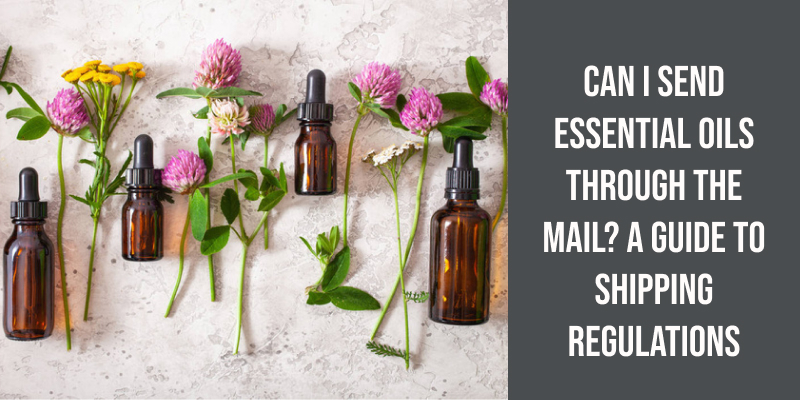Yes, you can send essential oils through the mail, although special regulations apply. Because essential oils are classified as hazardous material due to their flammability, shipping by air is heavily regulated, often requiring proper packaging and declaration. But, for ground shipping, especially when dealing with small quantities for personal use, the rules are less strict. Packages should be prepared correctly to prevent leaks or damages. Each carrier such as USPS, UPS, and FedEx may have specific policies that need to be followed, including correct labeling and paperwork, so you should check with them before mailing. It’s also important to comply with laws of the destination country when shipping internationally, as some may have stricter regulations on importing essential oils.

How Do You Send Essential Oils in the Mail?
Essential oils are becoming increasingly popular due to their various health benefits, but many people wonder how to safely send them through the mail. It’s important to note that essential oils contain hazardous materials, so they must be shipped using ground services. Shipping them through air mail is prohibited due to safety measures, so it’s important to take note of this before sending your package.
Before you send your package, ensure that you pack the oils properly. Since most essential oils come in glass bottles that are fragile, use bubble wrap or a foam insert to cushion them. Place the wrapped bottles in a sturdy cardboard box to keep them secure during transit. It’s also important to check that the packaging isn’t leaking before shipping.
To protect the recipients of the oils, include a limited quantity label on the package. This is a requirement for all hazardous materials, and it communicates to shippers that the contents of the package are limited in quantity. It additionally indicates that anyone who comes into contact with the package should take necessary safety precautions.
Lastly, select a reputable shipping carrier to safely transport your package. Carriers such as FedEx or UPS are experienced in safely shipping hazardous materials and can provide guidelines to follow when it comes to shipping essential oils. Using their services will ensure that your package arrives safely at it’s destination.
Proper packing with cushioning materials and a sturdy cardboard box is essential to prevent leakage and breakage during transit. Add a limited quantity label to the package to indicate that the contents aren’t hazardous when shipped in small quantities.
Tips for Proper Storage of Essential Oils Before Shipping
When storing essential oils before shipping, it’s important to keep them in a cool, dry place away from direct sunlight and high humidity. It’s also recommended to use amber or dark glass bottles to protect the oils from light and to avoid plastic containers. Additionally, make sure to label each bottle with the name of the oil and it’s expiration date.
When it comes to giving gifts, essential oils are a popular and thoughtful choice. They offer a range of benefits that make them a great choice for anyone looking to promote relaxation and well-being. From essential oil cases to aromatherapy jewelry, there are many ways to give the gift of aromatherapy. However, before purchasing essential oils as a gift, it’s important to consider a few factors to ensure that it’s the right choice for the recipient.
Can UPS Ship Essential Oils?
Essential oils are volatile, aromatic liquids that are extracted from plants, fruits, and flowers. They’re used in a variety of applications, from aromatherapy to natural medicine. Due to their natural properties, essential oils are considered to be hazardous when being shipped. UPS is one of the leading logistics companies that’s known for it’s ability to transport different types of goods, including essential oils. Interestingly, shipping essential oils with UPS can be done, but with caution.
To ensure that the essential oils are handled correctly during shipping, UPS follows specific guidelines set by the International Air Transport Association (IATA).
When shipping hazardous materials, including essential oils, UPS may impose special handling or fees depending on the size of the package. Specifically, if the package is larger than 1 oz, there may be additional charges or handling requirements. This is done to ensure that the essential oils are packed securely and handled with care.
The company adheres to strict safety standards to ensure that the oils are transported securely and without incident. However, extra fees may be imposed for handling larger packages to cover the cost of specialized transportation.
How Should Essential Oils Be Packaged and Labeled When Shipping Them With UPS or Other Carriers?
- Choose a sturdy and leak-proof container that can withstand the rigors of shipping.
- Ensure that the essential oil bottles are tightly sealed and securely packaged to prevent any leakage during transit.
- Label each container with the name of the essential oil and it’s botanical name (if applicable), along with any precautions or warnings such as “keep out of reach of children” or “for external use only.”
- Include an invoice or packing slip that accurately reflects the contents of each package.
- If shipping internationally, be sure to comply with all applicable regulations and guidelines for shipping essential oils.
Does FDA Test Essential Oils?
The FDA’s primary role regarding essential oils is to regulate them under the category of cosmetics and, in some cases, as food additives or dietary supplements. However, the regulation of essential oils is somewhat limited compared to drugs and medical devices.
However, this lack of regulation doesn’t mean that essential oils are completely untested or unregulated. Many essential oil companies conduct their own internal testing and quality control measures, and some third-party organizations also conduct testing and certification programs. In addition, the FDA does have some responsibility for ensuring the safety of essential oils as part of it’s overall mission to protect public health. Let’s take a closer look at what this means for consumers who use essential oils.
Here’s a brief overview of how the FDA regulates essential oils:
Cosmetic Use: If essential oils are used in cosmetic products, such as lotions, creams, or perfumes, they are regulated by the FDA’s Office of Cosmetics and Colors. Manufacturers are responsible for ensuring the safety of their cosmetic products, including essential oils, and for complying with labeling requirements.
Food Additives: Certain essential oils are generally recognized as safe (GRAS) and can be used as flavoring agents or food additives. The FDA regulates these essential oils for food use.
Dietary Supplements: Some essential oils are marketed as dietary supplements, which fall under the jurisdiction of the FDA’s Office of Dietary Supplement Programs. Manufacturers of essential oil dietary supplements are responsible for ensuring their products are safe and appropriately labeled.
Medical Claims: It’s important to note that the FDA closely monitors any essential oil product making medical claims, such as treating or curing specific diseases. Essential oils are not approved as drugs, and making medical claims without FDA approval is considered a violation of federal law.
Additionally, the FDA does require that essential oil companies follow certain labeling regulations. Companies must include a list of ingredients on their product label, as well as the company name and the products intended use. This is to ensure that consumers are aware of whats in the product and how it should be used.
It’s essential for consumers to use essential oils safely and appropriately. Essential oils are highly concentrated plant extracts and should be used with caution. If you have specific health concerns or medical conditions, consult with a healthcare professional before using essential oils.
How Can Consumers Ensure That They Are Purchasing High-Quality Essential Oils?
Consumers can ensure they’re purchasing high-quality essential oils by researching the brand and it’s reputation, checking for purity and quality certifications on the label, and looking for oils that are sourced from reputable and sustainable farms or producers. It’s also important to understand the specific properties and characteristics of the oil they’re looking to purchase and to read reviews from other users before making a purchase.
Source: Are Essential Oils Regulated? – FALK Aromatherapy
Is It Okay to Gift Essential Oils?
However, it’s important to consider a few factors before gifting essential oils. First, it’s important to determine if the recipient has any sensitivities or allergies to certain oils. Some essential oils can cause skin irritation or allergic reactions in some individuals. It’s also important to consider the age and health of the recipient. Essential oils shouldn’t be used on young children, pregnant women, or individuals with certain health conditions.
Another factor to consider is the quality of the essential oils. Cheap essential oils may be mixed with synthetic fragrances or diluted with carrier oils, reducing their effectiveness and possibly even causing harm. It’s important to ensure that the essential oils are pure, organic, and ethically sourced. One way to ensure this is to purchase from reputable companies that provide third-party testing and certification.
When giving the gift of essential oils, it’s important to provide instructions on how to use them safely and effectively. This can include dilution ratios, recommended application methods, and potential side effects. It’s also important to advise the recipient to conduct a patch test before using the oils to prevent any adverse reactions.
Additionally, it may be helpful to provide some educational materials on aromatherapy and the benefits of the specific oils being gifted. This can include books, pamphlets, or even a link to informative websites.
Lastly, it’s important to consider the recipients personal preferences and needs. Different oils have different therapeutic properties, and it may be more beneficial to gift oils that address specific concerns such as stress relief, insomnia, or respiratory issues. It may also be helpful to consider the recipients lifestyle and offer oils that can be incorporated into daily routines such as diffusing during meditation or adding to a bath.
By taking these factors into consideration, the gift of aromatherapy can bring relaxation, peace, and wellness to your loved ones.
When it comes to shipping fragrance oils, it’s important to know the flashpoint of the oil as it can impact the shipping method required. While some oils can be shipped through USPS, others may require UPS Ground which can be more expensive. Nonetheless, there are still ways you can ensure your fragrance oils arrive safely and securely to their destination.
Can You Ship Fragrance Oils?
As a seller of fragrance oils, you may be wondering if you can ship them and what restrictions apply. Fragrance oils are considered hazardous materials and must be shipped in accordance with the regulations set by the Department of Transportation (DOT).
One of the main factors to consider when shipping fragrance oils is the flashpoint. The flashpoint is the temperature at which the fragrance oil can ignite. If the flashpoint of the fragrance oil is 141°F or less, it can’t be shipped via USPS and must be sent via UPS Ground. This can make shipping these fragrances more expensive than usual, as UPS Ground rates tend to be higher than USPS rates.
This includes using caution labels, hazard labels, and shipping papers. You should also follow proper packaging guidelines, such as using appropriate containers and cushioning materials to prevent breakage during transit.
By properly labeling and packaging your fragrance oils, you can protect yourself and your customers from potential hazards and legal issues.
Conclusion
In conclusion, the question of whether or not you can send essential oils through the mail is highly dependent on the regulations of the shipping service you choose to use. As a result, it’s important to research shipping regulations and follow proper safety guidelines to ensure your package arrives safely and without incident.





